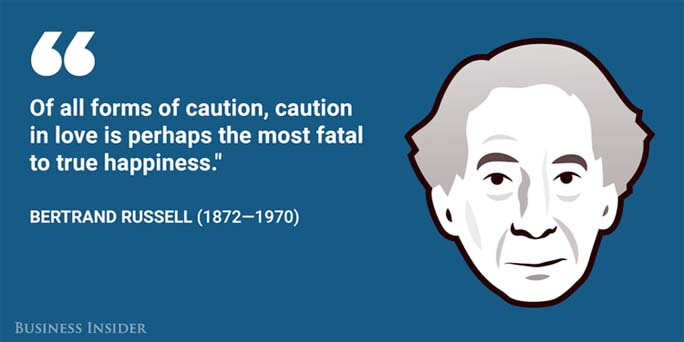
Michael W. Austin :
Bertrand Russell remains one of the most influential philosophers of the past century. His work in logic, philosophy of mathematics, philosophy of religion, and moral philosophy is still read and discussed today. Russell has some interesting and very relevant things to say about the good life, about what we can do in order to be happy.
For Russell, the key to happiness is to focus on external objects and interests. It is found in turning one’s focus outward. This is a cure for our unhappiness.
Assuming we have our basic needs met, and a decent life, what else can we do in the here and now to achieve happiness?
First, we need to abandon self-absorption, as much as we can. Some of us are absorbed in our own moral failings. Others are drowning in a narcissistic current of self-admiration and the desire to be admired by others. Still others desire personal power; they want to be feared. None of this will bring the happiness we desire.
In contrast to this, the happy person must have food, shelter, health, love, successful work, and the respect of others. Such a person will also have “external interests.” For Russell, these included three passions that governed his life, giving it meaning:
The Longing for Love: Love brings joy, it relieves our loneliness, and in his words is the closest thing to heaven that there is.
The Search for Knowledge: His intellectual interests were very wide. He sought to gain a deeper understanding of human beings, of the universe we live in, and of mathematics.
Pity for Human Suffering: We long to alleviate this, but often we cannot do so. We also experience it to varying degrees. But we should try to do what we can to reduce the suffering in the world.
In previous posts, I’ve discussed the thoughts of Plato, Aristotle, Augustine, and Pascal. Russell’s take is different in many ways, in part because of his atheism. Nevertheless, whatever our own religious and moral views, there is advice from Russell that we would all do well to take: focus less on ourselves, and more on the people and world around us.
(Michael W. Austin, Ph.D., is a professor of philosophy at Eastern Kentucky University).
Bertrand Russell remains one of the most influential philosophers of the past century. His work in logic, philosophy of mathematics, philosophy of religion, and moral philosophy is still read and discussed today. Russell has some interesting and very relevant things to say about the good life, about what we can do in order to be happy.
For Russell, the key to happiness is to focus on external objects and interests. It is found in turning one’s focus outward. This is a cure for our unhappiness.
Assuming we have our basic needs met, and a decent life, what else can we do in the here and now to achieve happiness?
First, we need to abandon self-absorption, as much as we can. Some of us are absorbed in our own moral failings. Others are drowning in a narcissistic current of self-admiration and the desire to be admired by others. Still others desire personal power; they want to be feared. None of this will bring the happiness we desire.
In contrast to this, the happy person must have food, shelter, health, love, successful work, and the respect of others. Such a person will also have “external interests.” For Russell, these included three passions that governed his life, giving it meaning:
The Longing for Love: Love brings joy, it relieves our loneliness, and in his words is the closest thing to heaven that there is.
The Search for Knowledge: His intellectual interests were very wide. He sought to gain a deeper understanding of human beings, of the universe we live in, and of mathematics.
Pity for Human Suffering: We long to alleviate this, but often we cannot do so. We also experience it to varying degrees. But we should try to do what we can to reduce the suffering in the world.
In previous posts, I’ve discussed the thoughts of Plato, Aristotle, Augustine, and Pascal. Russell’s take is different in many ways, in part because of his atheism. Nevertheless, whatever our own religious and moral views, there is advice from Russell that we would all do well to take: focus less on ourselves, and more on the people and world around us.
(Michael W. Austin, Ph.D., is a professor of philosophy at Eastern Kentucky University).

